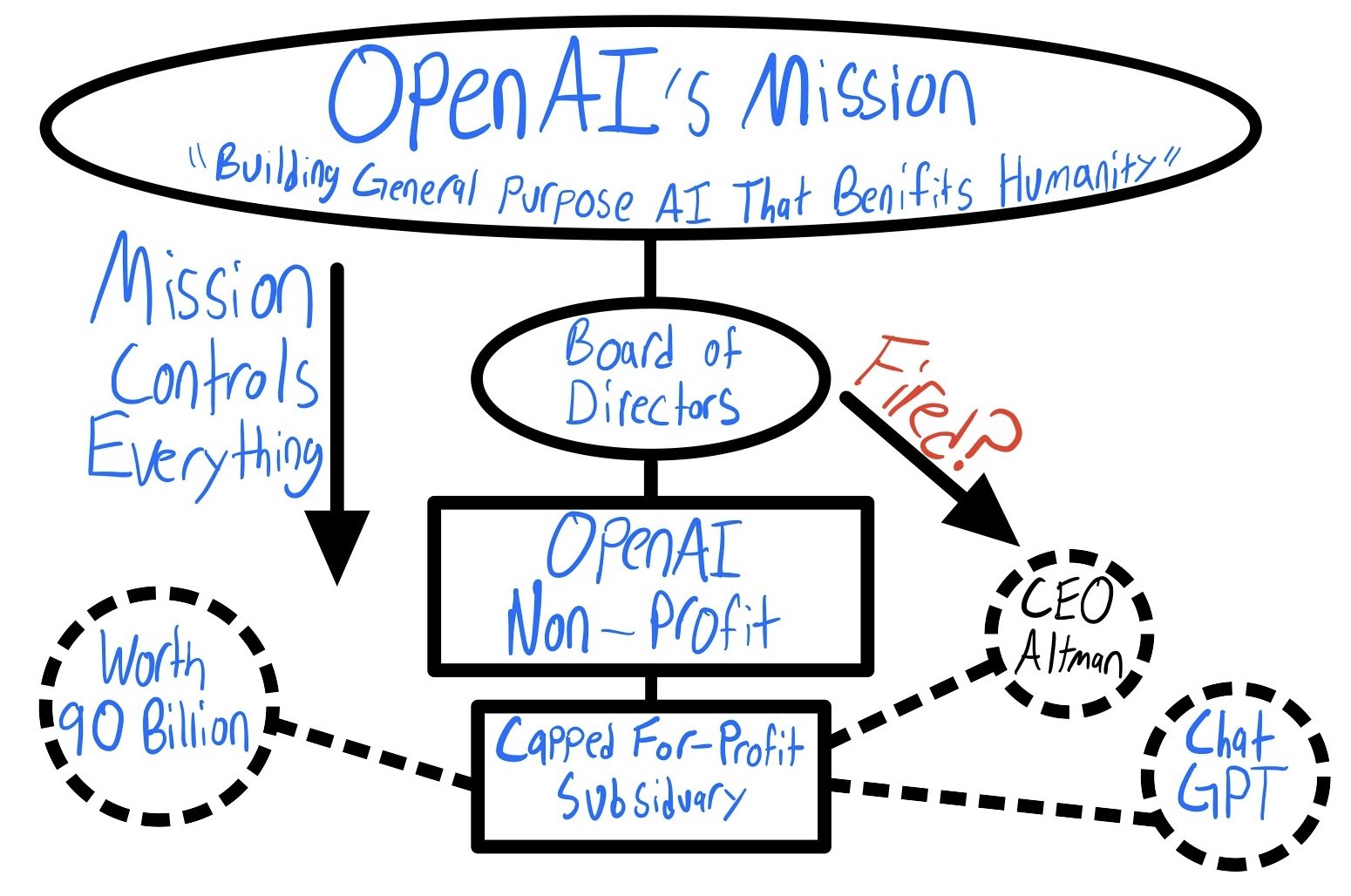Beyond Profit: Examining OpenAI's Vision-Centric Corporate Structure
Audio Narrations of each article found on Apple Podcasts, Spotify, or wherever you get your Podcasts
OpenAI’s Corporate Structure and other notes
OpenAI’s Corporate Structure is a Feature Not a Bug. While the rest of the tech industry was shocked by the sudden ousting of OpenAI, the company behind ChatGPT, CEO Sam Altman, I was more fascinated by the unique corporate structure of this “capped” for-profit company. Despite all the chaos at OpenAI being rooted in this unusual organizational set-up, I fundamentally believe that more companies structured in this way would be a net positive for the world.
While the story of Sam Altman’s brief departure from the company he founded is pretty juicy, there are only three parts to this saga that are relevant to why OpenAI’s corporate structure is oddly beneficial and should be more widely considered as a path toward a more conscientious business world.
Sam Altman was fired from the company he helped start because the board of directors felt he was harmful to the overall mission of the company.
OpenAI’s corporate structure is a capped for-profit company. A simple way to think about this is that OpenAI is a non-profit that contains within itself a for-profit commercial entity that can make money which Altman was/is the CEO of. OpenAI’s Board of Directors also acts as the “overall governing body for all OpenAI activities.” Board Members are independently appointed and do not hold any financial stake in the company.
OpenAI is driven by its mission statement which is to build and “ensure that artificial general intelligence benefits all of humanity” basically making sure AI is developed responsibly. Artificial General Intelligence (AGI) is the radical idea that AI will be able to accomplish any intellectual task a human can do (and depending on who you ask, become sentient). I don’t believe this will happen but that’s for another article.
OpenAI’s organizational structure allows it to operate in ways that completely separate it from a typical for-profit company. From OpenAI’s blog:
[OpenAI’s] goal is to advance digital intelligence in the way that is most likely to benefit humanity as a whole, unconstrained by a need to generate financial return.
If OpenAI were a typical for-profit company it would be driven by the same materialistic tendencies as any other company: profit. Instead, this mission-driven model means OpenAI has the latitude to operate in a way where profit isn’t the main focus. For example, throughout the business world, countless CEOs abuse their position and their board of directors do nothing. Why tolerate this behavior? Because unlike in OpenAI, Board Members of a for-profit company typically hold large stakes in the company and are financially incentivized to turn a blind eye to abhorrent behavior. So long as the CEO keeps providing financial value to the company they are financially incentivized to operate in this way. OpenAI’s Board being largely independent was more easily able to decide to fire him when they perceived a breach of his moral duties to the company's mission.
This quote from an article by Ben Thompson illustrates this point perfectly:
Here’s the reality of the matter, though: whether or not you agree … the board’s charter and responsibility is not to make money. This is not a for-profit corporation with a fiduciary duty to its shareholders; indeed, as I laid out above, OpenAI’s charter specifically states that it is “unconstrained by a need to generate financial return”. From that perspective the board is doing its job, as counterintuitive as that may seem: to the extent the board believes that Altman and his tribe were not “build[ing] general-purpose artificial intelligence that benefits humanity” it is empowered to fire him; they do, and so they did.
Looking at OpenAI through the lens of profit and continuous innovation above all else, it’s no wonder why many industry experts seem confused by why OpenAI would be structured this way. After all, if you valued profit above all else why would you incentivize board members to make more moral decisions, or put in place mechanisms that truly allow for a company’s mission to be above its desire for profit? See while a for-profit company has a a fiduciary duty to act in the best interest and drive a profit to its investors, a nonprofit with a for-profit entity has a fiduciary duty to stay true to its mission, the incentives of its for-profit commercial entity are secondary.
Where I think OpenAI and its capped for-profit model strikes a good balance is that its organizational structure allows for profit without it being the sole focus of the company. It’s naive to think that every company will act in the best interest of the world and completely ignore its own profit motive. OpenAI was able to create ChatGPT by creating a for-profit subsidiary and thus being able to raise capital to fund its endeavors. The Mozilla Foundation (the company behind the internet browser Firefox) has a very similar organizational structure as OpenAI, it uses the funds from its for-profit entity to run it like a proper company and fund its non-profit endeavors. See, to operate in the current business environment, you need to be competitive to attract talent and keep up with the pace of innovation. Making a profit is good, but can’t we live in a world where profit isn’t the sole reason for a company’s existence?
Silicon Valley’s obsession with profit ultimately proved incompatible with OpenAI’s business structure. After an intense turn of events, Sam Altman eventually returned as CEO through pressure from a big investor in OpenAI’s for-profit entity. The members of the independent board of directors that had advocated for Altman’s removal based on the premise that his leadership was no longer in line with the mission of OpenAI were replaced with members more inline with OpenAI’s for-profit endevors (to this end, it’s also no coincidence that the women were removed from the board of directors and ultimately replaced by men). Does this mean that nonprofits with a for-profit entity should be deemed a failure? Absolutely not. Just because the incentives favored a more moral and thoughtful outcome doesn’t mean that outcome would come to fruition. The world still needs a change in heart on its insatiable desire for power and profit.
I am apprehensive of the oversimplified worldview where the notion of a company being able to generate profit without making profit its central focus appears inconceivable. Despite caving to capitalistic pressures, OpenAI proved that it is possible to create an incredibly valuable revolutionary product without the traditional for-profit business structure Silicon Valley is used to. I’d argue that without the mission-centric nature of OpenAI’s corporate structure, many of the brightest minds behind ChatGPT would not have joined one company. Many companies have missions like environmental well-being or helping any given community, so why not have mechanisms that ensure commitment to said missions?
My intention in writing an article on corporate structures isn’t to demonize the desire for profit. Wanting to provide financial comfort and security to those around you and the families of the people you employ is a noble endeavor, as is wanting to forge a different path and create a product or service. But the world around us has shown that having profit as our north star isn’t sustainable.¹ Having mechanisms in place that structurally embed a company’s mission statement above all else allows for the focus to shift from a profit-driven world to a mission-driven one. From there, concepts such as widening the definition of shareholders of a company to also include the environment, employee wellbeing, and members of the surrounding community begin to take shape. If a board of directors is truly independent, why not include a board seat reserved for employees so their voices can be more directly heard? Shifting the lens through which we look at a business beyond profit and towards working for the betterment of humanity is an essential step towards a more united world. Achieving lasting progress requires a change in both structure and spirit.
¹ Even the concept of sustainability is significantly hindered by the frequent reality that all too often sustainable business practices aren’t as profitable.







